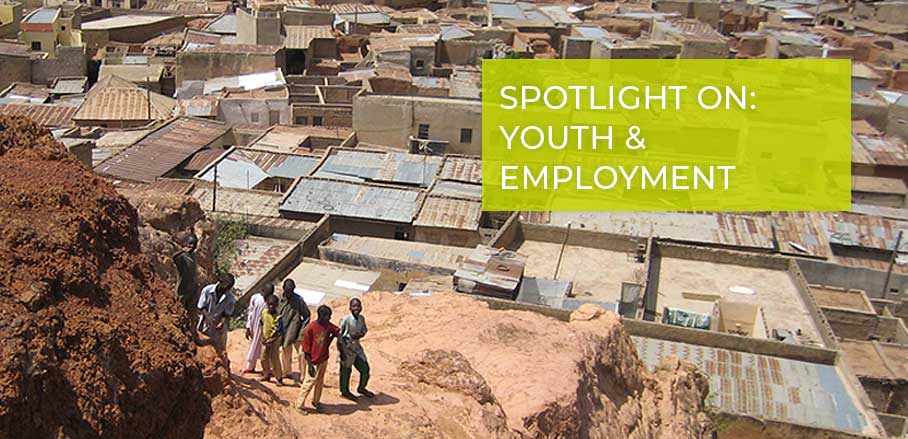Rural-Urban Migration and Youth Unemployment in Nigeria: Why Public Programmes Fail
With many young Nigerians relocating from rural to urban areas, unemployment is on the rise. Charles Ogheneruonah Eghweree and Festus Imuetinyan sketch out possible policy responses.
Migration entails movements of people from one geographical location to another. Rural-urban migration means people are relocating from rural areas to cities. Such movements often occur in search of life-changing opportunities, and are associated with the young and able-bodied population in many countries, especially in developing countries where there is a clear disparity between rural and urban centres in terms of social service and infrastructures.
The Nigerian state has had its fair share of rural-urban migration due to dearth of needed infrastructural facilities in the rural areas and alleged prospects of a better life in the urban areas. Such movements contribute to and worsen the unemployment situation in urban centres. Cities such as Lagos, Port Harcourt, Kaduna, Enugu, Benin, and Warri among others, remain chosen destinations for the young Nigerian labour force.
Influx into the urban centres leads to population explosion and unintended consequences. Nigerian urban centres are projected to be home to over 200 million people in the next 40 years. Lagos as one of the fastest growing urban centre in the world is expected to take in the biggest chunk of these new arrivals.
Rural to Urban Migration is Not a New Phenomenon
Rural-urban migration and urbanisation in particular is not new and predates the post-colonial Nigerian state. Cities such as Lagos, Port Harcourt, Kano, Katsina, and Sokoto played active roles in the worldwide commercial activities of the medieval period. As it was in the pre-colonial and colonial era, in post-colonial times these cities also gave impetus to rural-urban migration due to the modern facilities, increased commercial and industrial activities and supposed job opportunities they offer, that keep attracting local migrants.
Moving to the Cities: Hopes Measured Against Reality
While rural-urban migrants expect to secure jobs, reality paints a contrary picture as massive urbanisation births urban youth unemployment. Out of the estimated 1.8 million youths that enter the Nigerian urban labour market annually (Falusi, 2014), only few get jobs due to paucity of employment opportunities. While few are able to find suitable jobs, many occupy themselves with odd jobs to survive in the city where they expected to find life changing opportunities on a platter of gold.
As an immediate consequence, unemployment figures soar and many rural-urban migrants gradually descent into crime. This leaves a situation where hopes are dashed at the altar of reality.
Implications of Migration on Urban Youth Unemployment
Unmitigated rural-urban migration increases urban youth unemployment to a critical level, creating a whole set of challenges often seen manifested in social problems. Besides shortages of basic amenities in the urban centres due to population explosion on account of rural-urban migration, urban youth unemployment leads to poverty and inequalities. Inequality fuels instability and unrest. When this is the case, large groups of jobless urban youths, economically dislocated with diminished employment opportunities, become willing recruits into Armed None-State Groups (ANSGs) and hence pose a tangible threat to internal security.
Policy Response
Response of the Nigerian state government to urban unemployment comes in form of policies and institutional provisions. These are woven around four principles that emphasize:
- Employability: investing in education and vocational training for young people, and improving the outcomes of those investments.
- Equal Opportunities: giving young women the same opportunities as young men.
- Employment Creation: place employment creation at the centre of macroeconomic policy.
- Entrepreneurship: making it easier to start or run enterprises to provide more and better jobs for young women and men.
Other more direct responses to urban youth unemployment in Nigeria include measures such as the creation of the National Directorate of Employment (NDE), the National Poverty Alleviation Programme (NAPEP), the Subsidy Reinvestment and Empowerment Programme (SURE-P), and the Youth Enterprise with Innovation in Nigeria (YOU-WIN). All these are geared towards dealing with youth unemployment.
Why Policies Fail
Laudable as these programmes seem, so far they have all failed to reduce urban youth unemployment. This is due to their wrong conceptualisation and vague nature of the intervention programmes, which fail to proffer solutions for the problem.
There is also the issue of poor management and administrative oversight of these programmes, huge political influence that thrives on patronage politics, as well as a lack of synergy between the federal, state, and local governments. The Nigerian state runs a centralised federal system tilted heavily against the state level. This vitiates purposive initiative by the states to curb urbanisation in the first place and resultant urban youth unemployment by extension.
What can Be Done?
Government at all levels needs to re-focus unemployment programmes and make them purpose-driven. This means shifting from a mere prescriptive employment drive to wealth creation capability through entrepreneurial activities by youths. Entrepreneurship has the highest capacity to trigger self-employment and create employment for sustainable development.
In addition, driving factors of rural-urban migration need to be addressed. Improved rural infrastructures will discourage urban influx. Again, the Nigerian government needs to double its efforts towards providing enabling environments for business to grow, while simultaneously encouraging job creation for the teaming youth population in the country. Finally, we recommend that government should de-emphasize political considerations in deciding beneficiaries of youth employment programmes in general and urban youth employment programmes in particular, especially in urban centres like Lagos with a growing urban youth population.
